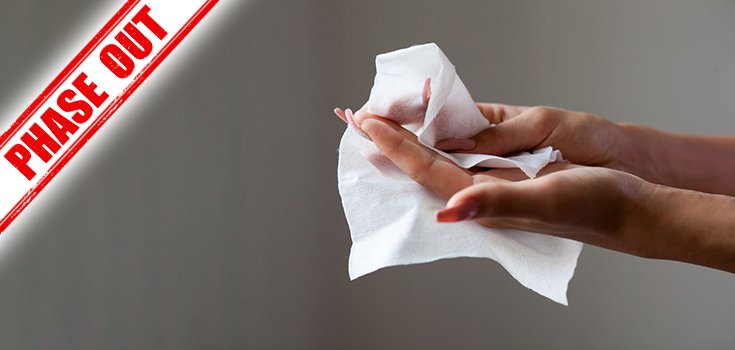UK Unveils Plan to Ban Single-Use Plastics, Including Wet Wipes

The UK is considering whether to make a plan to eliminate single-use plastics by the year 2025 legally binding. Wet wipes are included; and if they are subject to an outright ban, UK residents may no longer be able to buy them.
Tens of thousands of wet wipes are sold, used, and flushed down the toilet in Britain each year. The wipes contain plastic that breaks down into millions of microfibers that clog sewers and that kill fish and other wildlife in rivers and other waterways as they are released.
A spokeswoman for the Department for Environment, Food and Rural Affairs (DEFRA) said:
“We are continuing to work with manufacturers and retailers of wet wipes to make sure labeling on packaging is clear and people know how to dispose of them properly – and we support the industry’s efforts to make their customers aware of this important issue.” [1]
She would not say whether selling or purchasing wet wipes would become illegal or when the measure would begin.
DEFRA said it is mulling new taxes to reduce the amount of single-use plastics wasted.
Read: Humans Have Created 9 Billion Tons of Plastic in 67 Years
Environment secretary Michael Gove decided to launch the initiative after being informed in mid-April 2018 by a group that cleans up rivers that wet wipes were altering the shapes of river beds.
More than 5,000 wet wipes were discovered alongside the Thames in an area half the size of a tennis court.
In December 2017, Water UK said that the largest-ever comprehensive study of sewer blockages found that wet wipes flushed down toilets were the biggest culprit. Water and sewage companies, in addition to the environmental agency, have complained about wet wipes clogging up the systems.
Wet wipes contribute to “fatbergs” – giant congealed globs of fat and garbage in sewer systems. Experts think there are at least 12 of these fatbergs currently under London. The blobs clog and break pipelines and are expensive to remove. Last year, one of the biggest fatbergs ever recorded was found in east London. It weighed 130 metric tons, the equivalent of 11 double-decker buses. It was also over twice the length of two football pitches. [1], [2]

The problem goes beyond London. New York City spent more than $18 million from 2010-2015 fixing issues caused by wet wipes. [2]
The measure is the latest in a long line of efforts to reduce damage to the UK ecosystem. So far, the government has banned microbeads, which kill marine life; introduced an extra charge for plastic bags; and introduced a plan to ban the sale of plastic straws, plastic stirrers, and cotton swabs.
For now, several UK supermarkets and food companies have voluntarily signed a pledge to cut plastic waste while ministers consider making the imitative legally binding. So far, 42 businesses have signed the pledge including Tesco, Sainsbury’s, Morrison’s, Aldi, Lidl, and Waitrose. [3]
As part of the pledge, the signees aspire to make all plastic packaging reusable, recyclable, or compostable by 2025.
Said Gove:
“Our ambition to eliminate avoidable plastic waste will only be realized if government, businesses, and the public work together.
Industry action can prevent excess plastic reaching our supermarket shelves in the first place. I am delighted to see so many businesses sign up to this pact and I hope others will soon follow suit.” [3]
Read: Starbucks Testing Recyclable Cups in the UK to Tackle Waste
However, the supermarkets have thus far refused to disclose how much plastic packaging they put on the market, nor have they committed to paying more to recycle it. Moreover, these supermarkets and their representative bodies have strongly lobbied the government against forcing them to pay more to collect and recycle their plastic and other waste, documents published under freedom of information laws show.
Sources:
[1] Independent
[2] EcoWatch
[3] The Guardian
